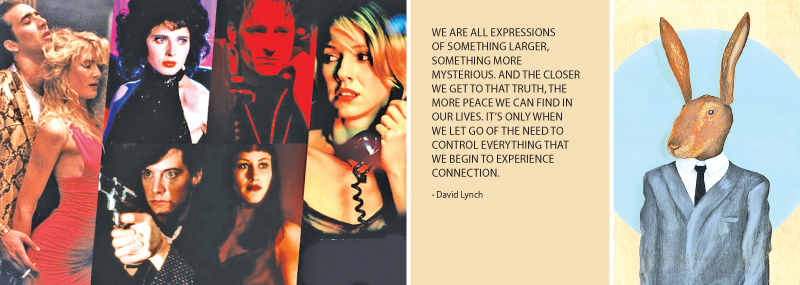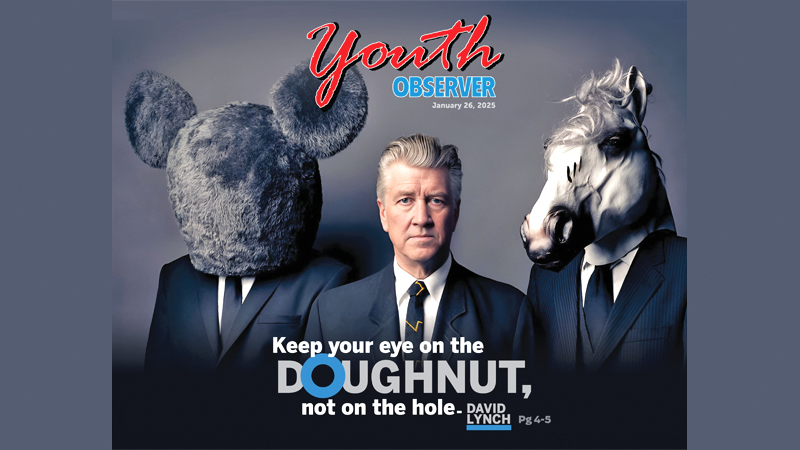 What does it mean to be a filmmaker? What is a filmmaker trying to reveal through cinema? Why does one choose to pursue this path? To answer these questions, one name stands out: David Lynch. To label David Lynch merely as a filmmaker would restrict his capabilities; he is a one-of-a-kind, rare artiste with a singular and unique artistic identity. He has brought human experiences and expressions to the visual medium in new dimensions, revealing visual truths and profound realisations about life and existence, something larger, more mysterious, brutal, and monstrous, through his work, which reflects the enormous freedom he has acquired as an artiste.
What does it mean to be a filmmaker? What is a filmmaker trying to reveal through cinema? Why does one choose to pursue this path? To answer these questions, one name stands out: David Lynch. To label David Lynch merely as a filmmaker would restrict his capabilities; he is a one-of-a-kind, rare artiste with a singular and unique artistic identity. He has brought human experiences and expressions to the visual medium in new dimensions, revealing visual truths and profound realisations about life and existence, something larger, more mysterious, brutal, and monstrous, through his work, which reflects the enormous freedom he has acquired as an artiste.
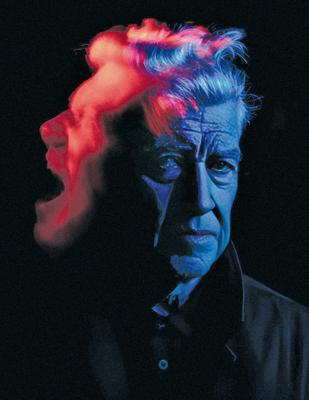 Lynch’s work challenged conventional narratives and invites audiences to explore the deeper, often surreal aspects of reality, bringing both the real and reality together at the same time. This fundamental uniqueness is how Lynchian cinema differs from that of other filmmakers.
Lynch’s work challenged conventional narratives and invites audiences to explore the deeper, often surreal aspects of reality, bringing both the real and reality together at the same time. This fundamental uniqueness is how Lynchian cinema differs from that of other filmmakers.
Artistic journey
The celebrated director, painter and creative force, born in Missoula, has left an indelible mark on the world at the age of 78. David Lynch began his artistic journey as a painter, eventually discovering filmmaking as his ultimate mode of expression. Despite establishing filmmaking as his most powerful outlet, he remained actively engaged in various art forms throughout his career. With ‘Eraserhead’, Lynch solidified his reputation as a visionary, presenting audiences with industrial soundscapes, grotesque imagery and cryptic storytelling, elements that became hallmarks of his boundary-pushing work. ‘Blue Velvet’ provided one of the most haunting explorations of suburban life ever captured, while ‘The Elephant Man’ showcased his unparalleled ability to evoke empathy from tragedy.
Although his ambitious adaptation of ‘Dune’ may not have achieved commercial success, the film introduced key collaborators of the likes of Kyle MacLachlan, who would play a pivotal role in bringing Lynch’s magnum opus, ‘Twin Peaks,’ to life.
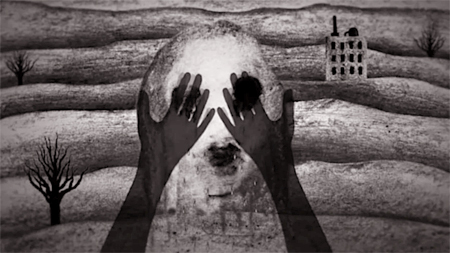
Lynchian cinema has been analysed, particularly through the lens of Lacanian psychoanalytic theories, by the famous Slovenian philosopher and thinker Slavoj Žižek. He has used these theories to analyse Lynch’s films, particularly ‘The Lost Highway’, describing Lynch’s work as a playful exploration of the ideological fantasies that support late capitalist society.
As the aesthetic of Lynchian cinema has influenced and inspired many filmmakers around the world, including several Sri Lankan filmmakers, we spoke to a few of them who recalled how they first heard about David Lynch’s existence as a filmmaker and how it has affected and changed their perceptions of cinema and life.
Lynch is truly special – Boodee Keerthisena
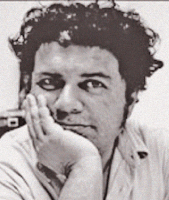 Filmmaker Boodee Keerthisena reflected on his journey of discovering David Lynch’s work. He shared, “Well, somewhere in 1981 or 82, I was going through Omni magazine. And they mostly carried science or science-related articles.” As he flipped through the pages, he recalled encountering a striking image on ‘The Police’ in a weird costume.
Filmmaker Boodee Keerthisena reflected on his journey of discovering David Lynch’s work. He shared, “Well, somewhere in 1981 or 82, I was going through Omni magazine. And they mostly carried science or science-related articles.” As he flipped through the pages, he recalled encountering a striking image on ‘The Police’ in a weird costume.
His curiosity was piqued when he discovered it was an article about Lynch’s film ‘Dune’. “That intrigued me and I began digging deeper.” Boodi said that at the time, “the internet wasn’t available,” which made accessing films more challenging. He either visited the library or contacted friends who could help him find Lynch’s work.
When he finally saw ‘Blue Velvet’ in 1987 during his time in the US, he was captivated. He described it as a film that truly resonated with him, saying, “I fell in love with it. Angelo Badalamenti’s music is one of the most striking elements and Lynch’s filmmaking draws you into the core of the story.” He highlighted a memorable scene, “The moment with Dennis Hopper singing into a light bulb microphone and Isabella Rossellini in the background, really stuck in my head.”
Boodi also noted how Lynch’s work influenced his own filmmaking, particularly with his film ‘Nimnayaka Hudekalawa’ (Alone in the Valley), “I used this Lynchian visual aesthetic, as my film was also about the blur between reality and dreams.” Reflecting on Lynch’s unique storytelling, he said, “Each of his films is different from the other,” showing admiration for the director’s distinct style. “Lynch is truly special in the cinematic sphere and I’m glad I discovered his cinema decades ago,” Boodi said.
His approach to filmmaking has influenced me greatly – Asoka Handagama
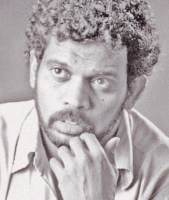 Asoka Handagama reflected on his experience with David Lynch’s work and said, “When I was making my first feature film, ‘Chanda Kinnari,’ in the early ‘90s, I had not yet heard of David Lynch. Before the film was released in 1998, I spent five years in the UK for my higher studies, during which time I learned about this filmmaker and watched a few of his films. However, I didn’t have a deep understanding of his cinema back then.”
Asoka Handagama reflected on his experience with David Lynch’s work and said, “When I was making my first feature film, ‘Chanda Kinnari,’ in the early ‘90s, I had not yet heard of David Lynch. Before the film was released in 1998, I spent five years in the UK for my higher studies, during which time I learned about this filmmaker and watched a few of his films. However, I didn’t have a deep understanding of his cinema back then.”
He recalled a significant moment in the late ‘90s or early 2000s when “Deepthi Kumara Gunaratne and his X movement discussed and analysed Lynch’s cinema through the lens of psychoanalysis. The insights they presented were fascinating to me as a filmmaker interested in Lynchian cinema.” Handagama continued, “I make movies, and in the meantime, I watch Lynch’s films whenever I get the chance. The audience can sense if Lynch has influenced the films I create. I have not intentionally followed him in my cinema, but his approach to filmmaking has influenced me greatly,” he added.
I met David Lynch – Vimukthi Jayasundara
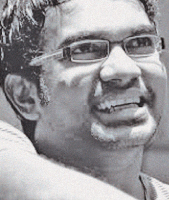 World-renowned filmmaker Vimukthi Jayasundara reflected on his memorable encounter with David Lynch and said, “I met David Lynch and in the funniest of ways,” It was 2007, and Jayasundara was in Paris, trying to board a plane on his way to Cannes. He was one of the first to get on the plane and as he entered, he noticed a familiar person already sitting. “It was David Lynch, one of his biggest influences. “I was so excited and elated. But of course, he had no idea who I was or how much he had influenced me.” Jayasundara recalled.
World-renowned filmmaker Vimukthi Jayasundara reflected on his memorable encounter with David Lynch and said, “I met David Lynch and in the funniest of ways,” It was 2007, and Jayasundara was in Paris, trying to board a plane on his way to Cannes. He was one of the first to get on the plane and as he entered, he noticed a familiar person already sitting. “It was David Lynch, one of his biggest influences. “I was so excited and elated. But of course, he had no idea who I was or how much he had influenced me.” Jayasundara recalled.
Despite his desire to approach Lynch, Jayasundara hesitated. “I wanted to talk to him, introduce myself and share that I was a filmmaker from Sri Lanka. I really wanted to express how much he had influenced me but I couldn’t bring myself to do it. So, I sat a few seats behind him, looking at the back of his head, arguing with myself about what I should do.” he said.
Ultimately, he decided to let go of his internal debate as he grew tired of his own neurotic self and thoughts and told himself, “It doesn’t matter. Let it go. I felt disappointed with the situation but thought it was best to give up and try to sleep.” he laughed.
However, a surprising turn of events awaited him after the flight. When Jayasundara got off the plane, he was looking for the person sent to pick him up and wondering about his luggage. The guy carrying the board with his name appeared and to his surprise, he was also holding a board with David Lynch’s name on it. They were going to be in the same vehicle. The Festival organisers had sent the same person for both of us. “That was a very Lynchian moment in my life, very surreal,” Jayasundara added.
Later, Jayasundara learned that Lynch was in Paris for an exhibition opening as he collects art and things. “What a coincidence!” He described Lynch as a very amiable and kind guy who waited for him to find his luggage before they shared a journey together. “He even gave me his email address,” Jayasundara added, reflecting on the memorable encounter.
Although he later reached out to Lynch, he said, “I wrote to him many years later to share my experiences with transcendental meditation, which we had discussed during the ride and to thank him. But he never replied. Well, he is David Lynch after all.”
As Jayasundara contemplated Lynch’s impact on his own filmmaking, he stated, “What truly stands out about Lynch is his freedom as an artist. He is a brave artist who uses cinema as a tool to express his vision, which is a rare quality among filmmakers.” He acknowledged Lynch’s diverse artistic pursuits. “His ventures into painting and interior design influenced me to explore other art forms such as painting and sculpture,” he further added.
Lynchian cinema embodied a mood, a tone and an entire aesthetic. He gifted us with Angelo Badalamenti’s haunting scores. As Lynch wisely stated, “I don’t know why people expect art to make sense. They accept the fact that life doesn’t make sense.” His legacy continues to inspire and challenge audiences to seek out the unexpected within our own unconsciousness. David Lynch passed away on January 15, 2025 at the age of 78. He is survived by his wife, Emily Stofle and four children.
Good night, Legend! You will be forever remembered!
